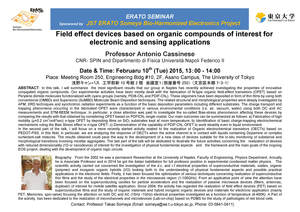TOPICS
- Information
- 2015
February 10th (Tue), Seminar Announcement: Associate Prof. Antonio Cassinese "Field effect devices based on organic compounds of interest for electronic and sensing applications"
Seminar Announcement
Speaker: Associate Prof. Antonio Cassinese
Ph.D (Physics)
Faculty of Engineering, Physics Department
the University of Naples
Title:Field effect devices based on organic compounds of interest for electronic and sensing applications
Date: February 10th (Tue), 2015
Time:13:00-14:00
Place: Meeting Room 1 (Room #250), Engineering Bldg 10, The University of Tokyo
Abstract:
In this talk, I will summarize the most significant results that our group in Naples has recently achieved investigating the properties of innovative conjugated organic compounds. Our experimental activities have been mostly dealt with the fabrication of N-type organic field-effect transistors (OFET) based on Perylene diimide molecules functionalized with cyano groups (namely, PDI8-CN2 and PDIF-CN2). These oligomers have been deposited in form of thin films by using both conventional (OMBD) and Supersonic (SuMBD) Molecular Beam Deposition techniques. The related structural and morphological properties were deeply investigated by AFM, XRD techniques and synchrotron radiation experiments as a function of the basic deposition parameters including different substrates. The charge transport and trapping phenomena occurring in the fabricated OFET were characterized in various environmental conditions (i.e. air, vacuum, water) using both DC and AC measurements and STM-BEEM technique. In particular, a close attention was paid to investigate the so-called Bias-stress phenomenon affecting these devices by comparing the results with that obtained by considering OFET based on PDFICN2 single crystal. Our main outcomes can be summarized as follows: a) Fabrication of high mobility (µ=0.2 cm2/volt*sec) n-type OFET by depositing films on SiO2 substrates kept at room temperature; b) Identification of basic charge-trapping electrochemical mechanisms ruling the Bias Stress effect in n-type OFET; c) Demonstration of the capability of PDIF-CN2 OFET to work steadily even in liquid environment.
In the second part of the talk, I will focus on a more recently started activity related to the realization of Organic electrochemical transistors (OECTs) based on PEDOT-PSS. In this field, in particular, we are analyzing the response of OECTs when the active channel is in contact with liquids containing Dopamine or complex surfactant-salt mixtures. The results obtained could pave the way to the development of a new class of devices suitable for the in-situ monitoring of substance and morphological transitions involving micellar aggregates. The last part of the talk will be dedicated to illustrate the future activities concerning the realization of devices with reduced dimensionality (1D or nanodevice) of interest for the investigation of physical fundamental aspects and the framework and the main goals of the ongoing EOS project, dealing with the development of organic logic circuits.
Sponsor: JST ERATO
Contact: Professor Takao Someya
(Email: someya@ee.t.u-t-okyo.ac.jp, Phone: 03-5841-0411)


